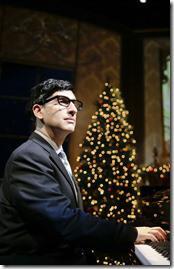
Hershey Felder
as Irving Berlin
Written by Hershey Felder
Royal George Theatre, 1641 N. Halsted (map)
thru Dec 6 | tix: $60 | more info
Check for half-price tickets
A magical evening with America’s greatest tunesmith
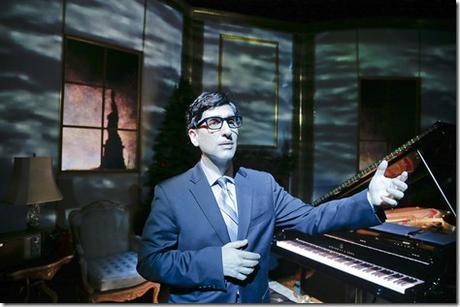
Eva Price, Samantha F. Voxakis and Karen Racanelli presents
Hershey Felder as Irving Berlin
Review by Lawrence Bommer
The title of the Royal George Theatre’s Midwest premiere is more concept than subject–Hershey Felder as Irving Berlin. Happily, the formula works brilliantly–because the equivalency is exact. A consummate music maker, Hershey Felder has regaled audiences with inside-out portrayals of George Gershwin, Stephen Foster, Ludwig van Beethoven, Frederic Chopin, Franz Liszt and Leonard Bernstein. This seventh simulation had to happen.
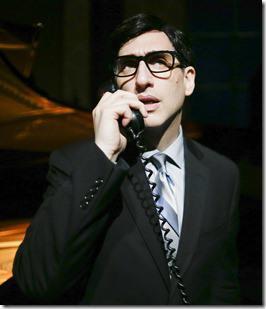
And he did it as a relative outsider. With astute projections and video, and searing anecdotes, Felder, depicting a centenarian growing younger as he remembers his instant success, conveys the renamed Berlin’s flight from Czarist pogroms to the Lower East Side, a new world where he finally became a citizen, in 1918, at age 30. By then, with “Alexander’s Ragtime Band,” he had yoked his genius to a new sound. Maintaining total craftsmanship even as he could barely play the piano, he reinvented himself with each marriage (the second, to an heiress who was initially disowned by her tony clan for marrying a “singing waiter,” lasted 62 years). However famous they became, the songs’ sources ran deep and private: Most wrenching here are the ballads he wrote for his children, not all of whom lived long enough to sing them.
Manically possessive and protective of his oeuvre, Berlin fought tenaciously for the literal rights to his music–and this self-preservation saved him during the Depression. The one constant is how doggedly Berlin sought in art a perfection that life never offered. Losing loved ones early and often, he continually sought safety in his “comfort songs.” They work for us (just) as well: Just listen to “How Deep Is The Ocean?,” “Oh, How I Hate To Get Up in the Morning!,” “Let’s Have Another Cup of Coffee,” “Count Your Blessings Instead of Sheep,” and “Stepping Out With My Baby,” and you’re flooded with happiness in both ears. (As he did so well as George Gershwin, Felder not only croons these numbers to put us present at the creation but allows the audience the occasional sing-along: Karaoke gets no bigger…)
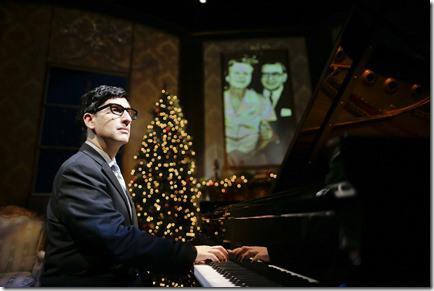
A treasure to Hollywood and Broadway, Berlin lit up movie theaters and marquees, making the American dream a waking wonder. The silver screen saw Al Jolson in the first musical talkie belting out Berlin’s glorious rouser “Blue Skies” (the most serene song ever written). Berlin set the scores for Astaire and Rogers’ dance triumphs and for Judy Garland in “Easter Parade” and Rosemary Clooney in “Holiday Inn.” He gave us topical–and integrated–revues like “As Thousands Cheer” (with Ethel Waters singing “Supper Time,” a lament for a lynching) and the unforgettable Ethel Merman vehicles “Annie Get Your Gun” and “Call Me Madame.” He offered Kate Smith the song of her career, still heard in countless baseball stadia during seventh innings. And, apart from our other national anthem, it was a Jewish composer who created the two greatest numbers for the biggest Christian holidays–“White Christmas” and “Easter Parade.”
Out of touch with Broadway when his uncritical patriotism couldn’t sell the 1962 flop “Mr. President,” Berlin retreated to the cozy Christmas-decorated parlor where Felder finds us, a lion in winter whose best memories spring fresh from his keyboard. (When you’re a composer, you’re no older than the notes you play.) For the last quarter century of his life, Berlin and his beloved Ellen were recluses. Reduced to retrospection, he bitterly demanded royalties to make up for the respect he really craved. He forgot, it seems, what the equally great melody-maker Jerome Kern said: “Irving Berlin has no place in American music–he is American music.” Hershey Felder just put him in his place.
Rating: ★★★★
Hershey Felder as Irving Berlin continues through December 6th at Royal George Theatre, 1641 N. Halsted (map), with performances Thursdays and Fridays at 7:30pm, Saturdays 3pm and 8pm, Sundays 2pm. Tickets are $60, and are available by phone (312-988-9000) or online through Ticketmaster.com (check for half-price tickets at Goldstar.com). More information at TheRoyalGeorgeTheatre.com. (Running time: 90 minutes without intermission)
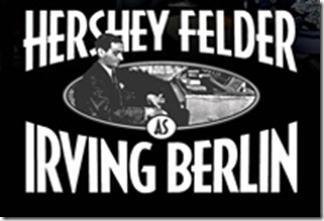
artists
cast
Hershey Felder (Irving Berlin)
behind the scenes
Trevor Hay (director, set design, scenic decoration), Hershey Felder (co-set design), Richard Norwood (lighting design), Andrew Wilder, Lawrence Siefert (projection design), Erik Carstensen (sound design, line producer), Meghan Maiya (dramaturg, scenic decoration), Jordan Hay (scenic decoration), Megan Snowder (master electrician), Michael Daly (sound engineer), Rebecca Peters, Brett Taylor (stage managers), Eva Price, Samantha F. Voxakis, Karen Racanelli (co-producers)
15-1103

